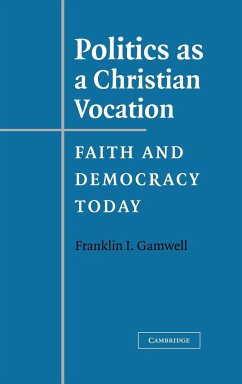Short description/annotation
Argues that Christian faith belongs in politics because both pursue rational forms of thought.
Main description
Many democratic citizens, including many Christians, think that separation of religion from the state means the exclusion of religious beliefs from the political process. That view is mistaken. Both democracy and Christian faith, this book shows, call all Christians to make their beliefs effective in politics. But the discussion here differs from others. Most have trouble relating religion to democratic discussion and debate because they assume that religious differences cannot be publicly debated. Against this majority view, this book argues that Christian faith belongs in politics because it shares with democracy a full commitment to rational pursuit of the truth. The book then develops ideals of justice and the common good Christians should advocate within the democratic process and shows the difference they make for contemporary politics in the United States, focusing specifically on issues of abortion, affirmative action, and economic distribution.
Table of contents:
Introduction: the present purpose; 1. Render to Caesar; 2. Government by the people; 3. Faith and the way of reason; 4. Justice in the community of love; 5. Religious decisions at stake; 6. Political deliberations; 7. Appendix: on the humanistic commitment.
Argues that Christian faith belongs in politics because both pursue rational forms of thought.
Main description
Many democratic citizens, including many Christians, think that separation of religion from the state means the exclusion of religious beliefs from the political process. That view is mistaken. Both democracy and Christian faith, this book shows, call all Christians to make their beliefs effective in politics. But the discussion here differs from others. Most have trouble relating religion to democratic discussion and debate because they assume that religious differences cannot be publicly debated. Against this majority view, this book argues that Christian faith belongs in politics because it shares with democracy a full commitment to rational pursuit of the truth. The book then develops ideals of justice and the common good Christians should advocate within the democratic process and shows the difference they make for contemporary politics in the United States, focusing specifically on issues of abortion, affirmative action, and economic distribution.
Table of contents:
Introduction: the present purpose; 1. Render to Caesar; 2. Government by the people; 3. Faith and the way of reason; 4. Justice in the community of love; 5. Religious decisions at stake; 6. Political deliberations; 7. Appendix: on the humanistic commitment.








